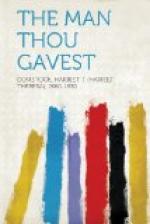He recalled his boyhood days when his uncle’s distrust and apparent dislike of him had driven him upon himself, almost taking self-respect with it. He re-lived the barren years when, longing for love and companionship, he found solace in a cold pride that carried him along through school and into college, with a reputation for hard, unyielding work, and unsocial habits.
How desperately lonely he had been—how cruelly underestimated—but he had made no outcry. He had lived his years uncomplainingly—not even voicing his successes and achievements. Through long practise in self-restraint, his strength lay in deliberate calculation—not indifferent action. He hid, from all but the Kendalls, his private ambitions and hopes. He studied in order that he might shake himself free from his uncle’s hold upon him. He meant to pay every cent he had borrowed—to secure, by some position that would supply the bare necessities of life, time and opportunity for developing the talent he secretly believed was his. He was prepared, once loose from obligation to old William Truedale, to starve and prove his faith. And then—his breakdown had come!
Cast adrift by loss of health, among surroundings that appealed to all that was most dangerous in his nature—believing that his former ambitions were defeated—old longings for love, understanding and self-revealment arose and conquered the weak creature he was. But they had appealed to the best in him—not the evillest—thank God! And now? Truedale raised his head and looked about in the dim room, as if to find the boy he once had been and reassure him.
“There is no longer any excuse for hesitation and the damnable weakness of considering the next step,” thought Truedale. “I have chosen my own course—chosen the simple and best things life has to offer. No man in God’s world has a right to question my deeds. If they cannot understand, more’s the pity.”
And in that hour and conclusion, the indifference and false pride that had upheld Truedale in the past fell from him as he faced the demands of the morrow. He was never again to succumb to the lack of confidence his desolate youth had developed; physically and spiritually he roused to action now that exactions were made upon him.
CHAPTER X
The following day Truedale heard the will read. Directly after, he felt like a man in a quicksand. Every thought and motion seemed but to sink him deeper until escape appeared impossible.
He had felt, for a moment, a little surprise that the bulk of his uncle’s great fortune had gone to Dr. McPherson—an already rich and prosperous man; then he began to understand. Although McPherson was left free to act as he chose, there had evidently been an agreement between him and William Truedale as to the carrying out of certain affairs and, what was more startling and embarrassing, Conning was hopelessly involved in these. Under supervision, apparently, he was to be recognized as his uncle’s representative and, while not his direct heir, certainly his respected nephew.




